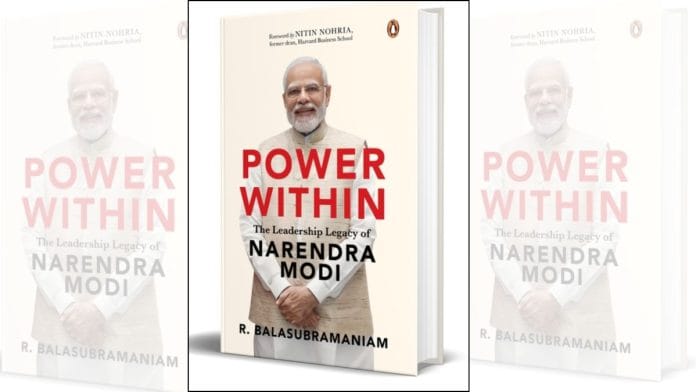New Delhi: Author R. Balasubramaniam has drawn references from both western and Indian philosophy to illustrate the leadership of the prime minister in his new book Power Within: The Leadership Legacy of Narendra Modi.
At the book launch in Delhi Saturday, the author said: “In a country where we discuss maya and the world of illusion, and where fake often seems more real than reality itself, expressing or writing about something becomes complex. We either romanticise India or Indic wisdom to such an extent that it loses its charm, or we criticise them so harshly that they become unpopular.”
He said that when he was seeking a leader to help him understand life through the Indic lens of leadership, someone who embodied his idea of Indian leadership inspired by the Vedas and historical Indian cultures, his leader Swami Sureshwaran suggested that he study the life of Narendra Modi, who was then the chief minister of Gujarat.
Initially unable to pursue this due to lack of access, Balasubramaniam later got a chance to work with Modi, now prime minister, on Mission Karmayogi, a civil service capacity-building programme. The author not only reported directly to Modi but also observed him closely as a person.
On the question of whether the Lok Sabha election results showed that Modi’s charisma had diminished, Balasubramaniam said his political skills might have been put to the test, but his leadership abilities had not been impacted.
“His ability to run a government while staying focused on ‘Viksit Bharat’… His capability to be extremely collaborative with his partners, which is the demand of the game today, is what sets him apart. Contrary to popular belief, his leadership hasn’t just been about the past 10 years. The context of the last decade differs from that of the next five years. His leadership adapts to this evolving context, ensuring his primary focus on developing the nation isn’t overlooked. That’s how I would put it,” he said in a conversation with ThePrint.
The book was launched by Amitabh Kant, former Niti Aayog CEO and G20 Sherpa, Ajay Piramal, chairman of the Piramal Group, NASSCOM president Debjani Ghosh, and IIM Bengaluru professor B. Mahadevan from at an event at the Pradhanmantri Sangrahalaya Saturday.
This was followed by a panel discussion where Kant shared an anecdote about how India built consensus on the New Delhi declaration when it held the G20 presidency last year. He said that after 16 failed drafts, the 17th draft succeeded after 258 bilateral meetings.
“Throughout the process, the prime minister received situation reports every two hours and emphasised the need for consensus,” Kant said, recalling the prime minister’s directive that if the G20 couldn’t reach a consensus, India would consider alternatives like BRICS and IPSA instead of remaining in the G20.
While discussing the title of the book with an analogy of an iceberg, Piramal, who had met and worked with Modi even before he became the chief minister of Gujarat, outlined the PM’s leadership through four fundamental principles – sadachar or alignment with values, seva or alignment with his purpose, shiksha or learning, and sadhana or alignment with the self.
Explaining each through anecdotes from various Upanishads and personal experiences, he praised Modi’s leadership for the “abrogation of Article 370”, the “surgical strikes”, and the inauguration of the Ram Temple.
‘Lot of inspiration flowing from his office’
With concepts including those from Bharata’s Natyashastra and Indian scriptures, Balasubramaniam in his book has delved into 50 years of Modi’s public life, including his days as a Rashtriya Swayamsevak Sangh (RSS) pracharak.
“What is important, as described in Indian scriptures, is the concept of bhava (expression) that needs to be transmitted. This occurs only through sahar udayata, a deep emotional connection that he is capable of achieving. Whether speaking to beneficiaries on the ground of a government programme, addressing pacharaks in an RSS meeting, interacting with cabinet colleagues, or engaging with international leaders, the ability to connect from the heart transforms the nature of relationships. Even in meetings with people like us, the way he speaks makes us feel deeply touched,” he told ThePrint.
While he reported directly to the prime minister for Mission Karmayogi, Subramaniam dismissed criticisms of “over-centralisation of power” under Modi’s leadership. He said, “He might have a process or procedure for articulating certain national aspirations set by the government… in this case, by the prime minister or the head of the government. Personally, I’m not inclined to believe in decentralisation. There’s certainly a lot of inspiration flowing from his office, especially from him.”
Balasubramaniam further elaborated, “When it comes to determining our direction — such as discussions on Viksit Bharat or the 25-year action plan — these ideas originate from him. Likewise, initiatives like Mission Karmayogi are unequivocally his ideas. However, in the last three years of my role here, I’ve not had a situation where I have been told to do something.”
When asked about the prime minister’s leadership facing scrutiny over the ethnic conflict in Manipur, the author said the governance across the entire country could not be centred around one individual. He added, “You cannot expect one person to come to Manipur and resolve the problem. There are a lot of tensions there, with many complex factors, similar to Kashmir… Whether it’s ethnic tensions, issues in the Northeast, or challenges like drug mafia and local politics. These are all real, adaptive societal tensions. You can’t solve them with just a stroke of a magic wand.”
“People might expect a magic wand from the prime minister. My understanding is that I’m sure problems will be resolved, but it will involve a careful, measured approach, gradually resolving the issue until the solution becomes visible to all of us,” the author added.
Balasubramaniam defined Modi’s leadership as visionary, strategic, and future-looking, adding he enjoyed the prime minister’s sense of humour the most, which many “did not know of”.
(Edited by Tiklil Basu)
Also read:






